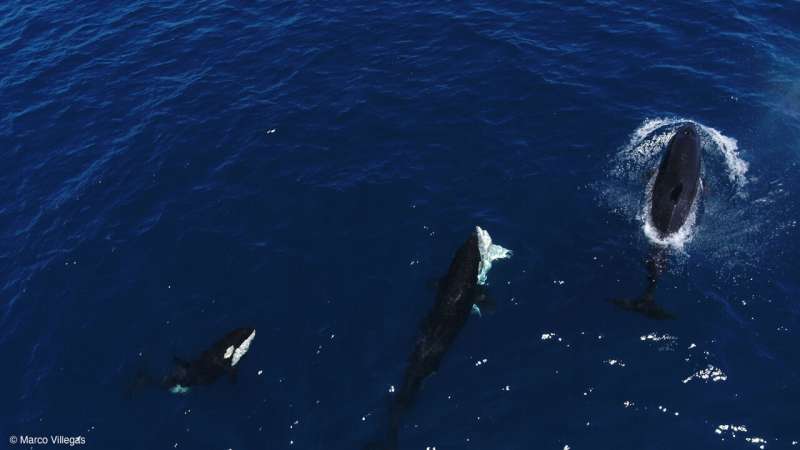Science
Orcas Target Juvenile Great White Sharks in Gulf of California

A specialized pod of orcas, known as Moctezuma’s pod, has been observed in the Gulf of California hunting juvenile great white sharks. These orcas employ a unique technique of flipping the sharks upside-down to access their energy-rich livers. This behavior suggests a potential shift in the hunting patterns of orcas, possibly driven by changing ocean conditions that affect shark nursery areas.
The findings, detailed in the journal Frontiers in Marine Science, stem from routine monitoring by marine biologists. They documented two separate hunts, during which three juvenile great white sharks were killed. The first incident occurred in August 2020, when five orcas worked collaboratively to turn a young shark upside-down before retrieving its liver. A similar scenario unfolded in August 2022, reinforcing the notion that this pod has developed a strategic approach to hunting.
Marine biologist Erick Higuera Rivas, the lead author of the study, emphasized the intelligence and social learning capabilities of orcas. “Orcas that eat elasmobranchs—sharks and rays—could eat a great white shark if they wanted to, anywhere they went looking for one,” he stated. This sophisticated hunting technique involves inducing a state known as tonic immobility, which renders the shark defenseless.
Understanding the Hunting Techniques
During the hunts, the orcas exhibited remarkable coordination. They flipped the sharks upside-down, leading to a state where the sharks were less aware of their surroundings. This tactic not only allows the orcas to extract the nutrient-rich liver but may also reduce the risk of being bitten during the process. According to Dr. Salvador Jorgensen, a co-author of the study, adult white sharks often evade hunting orcas, leaving juveniles vulnerable due to their lack of experience.
The research indicates that juvenile great whites may not react as rapidly to hunting orcas as their adult counterparts. “Adult white sharks react quickly to hunting orcas, completely evacuating their seasonal gathering areas and not returning for months,” Dr. Jorgensen noted. The scientists are still investigating whether these anti-predator responses are instinctual or learned.
Impact of Climate Change on Shark Populations
The increase in orca predation on juvenile great whites may be influenced by climate events, such as El Niño, which have altered the distribution of shark nursery areas. As these changes occur, juvenile white sharks may become more exposed to Moctezuma’s pod, which has already been seen hunting rays and other species. Each new cohort of juvenile sharks could represent a seasonal opportunity for the orcas.
The study highlights the need for further research into the dietary patterns of orcas. Dr. Francesca Pancaldi from the Instituto Politécnico Nacional Centro Interdisciplinario de Ciencias Marinas emphasized that understanding the feeding behaviors of orcas is crucial for marine conservation efforts. “Generating information about the extraordinary feeding behavior of killer whales in this region will lead us to understand where their main critical habitats are,” she said.
The researchers plan to conduct a more extensive survey of the orca population to clarify their hunting habits. Such fieldwork poses logistical challenges and can be expensive, but the insights gained could inform management plans to mitigate human impact on these marine ecosystems.
The documented behavior marks a significant addition to our understanding of orca predation on great white sharks, with implications for marine biology and conservation strategies in a changing climate.
-

 Science2 weeks ago
Science2 weeks agoInventor Achieves Breakthrough with 2 Billion FPS Laser Video
-

 Top Stories3 weeks ago
Top Stories3 weeks agoCharlie Sheen’s New Romance: ‘Glowing’ with Younger Partner
-

 Business3 weeks ago
Business3 weeks agoTyler Technologies Set to Reveal Q3 Earnings on October 22
-

 Entertainment3 weeks ago
Entertainment3 weeks agoDua Lipa Aces GCSE Spanish, Sparks Super Bowl Buzz with Fans
-

 Health3 weeks ago
Health3 weeks agoCommunity Unites for 7th Annual Into the Light Walk for Mental Health
-

 Health3 weeks ago
Health3 weeks agoCurium Group, PeptiDream, and PDRadiopharma Launch Key Cancer Trial
-

 World3 weeks ago
World3 weeks agoR&B Icon D’Angelo Dies at 51, Leaving Lasting Legacy
-

 Entertainment3 weeks ago
Entertainment3 weeks agoRed Sox’s Bregman to Become Free Agent; Tigers Commit to Skubal
-

 Entertainment3 weeks ago
Entertainment3 weeks agoMother Fights to Reunite with Children After Kidnapping in New Drama
-

 Health3 weeks ago
Health3 weeks agoNorth Carolina’s Biotech Boom: Billions in New Investments
-

 Science3 weeks ago
Science3 weeks agoNorth Carolina’s Biotech Boom: Billions Invested in Manufacturing
-

 Top Stories3 weeks ago
Top Stories3 weeks agoDisney+ Launches Chilling Classic ‘Something Wicked’ Just in Time for October









